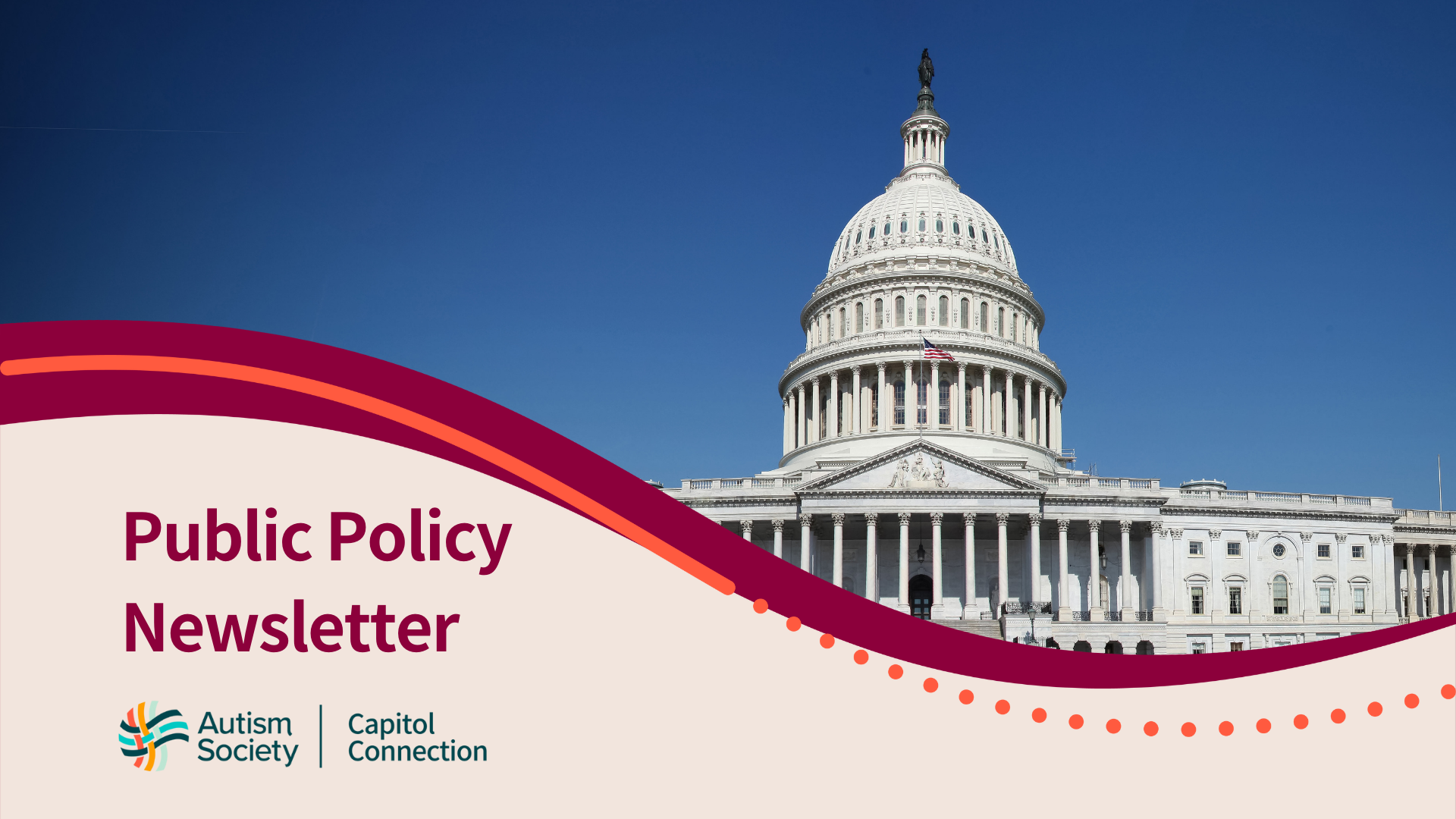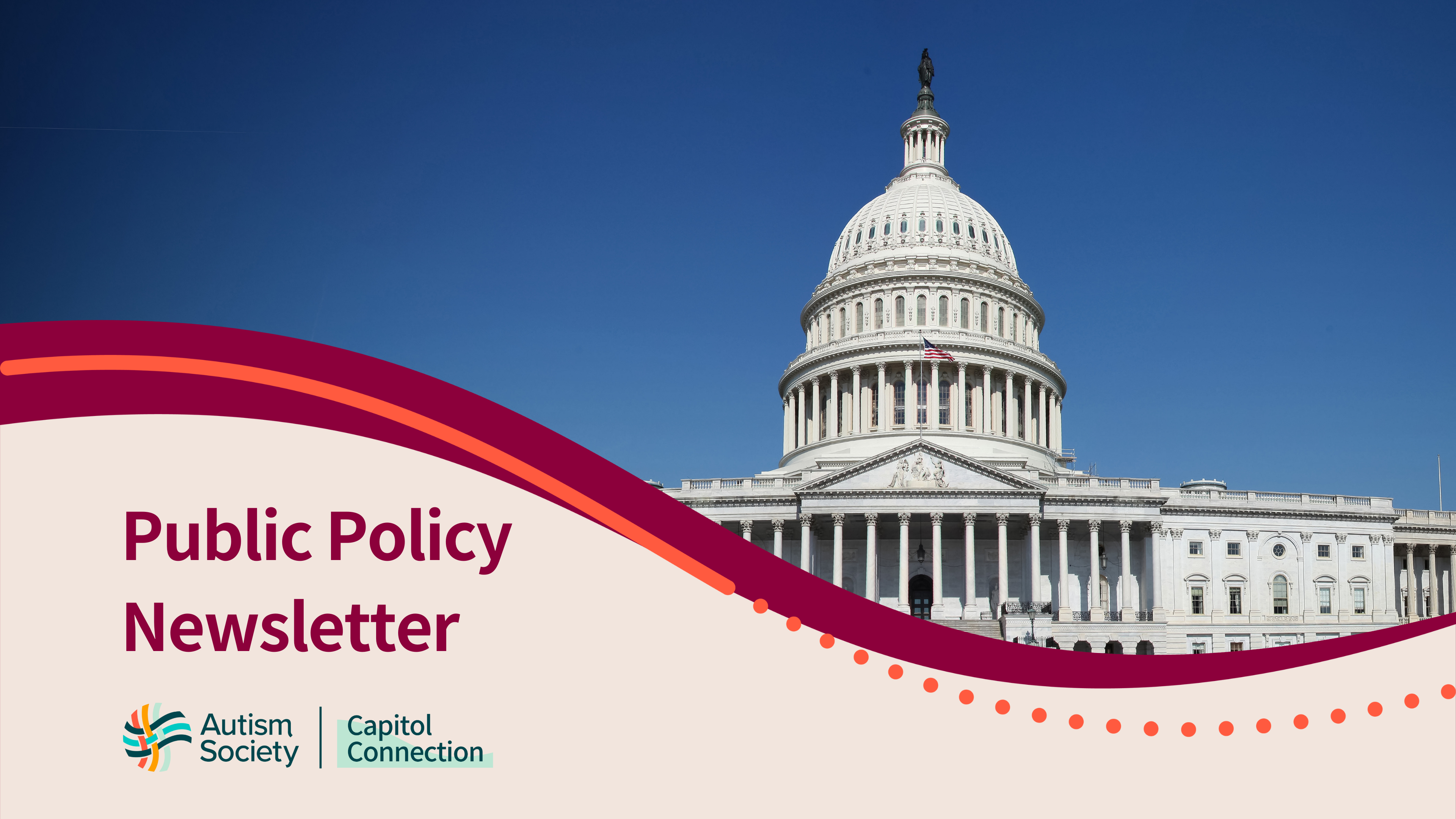
In this edition of Capitol Connection, find the Autism Society’s legislative goals for the 118th Congress, a welcome letter to all Members of Congress, an update on the federal budget, and legislation reintroduced in Congress. Resources on the unwinding of Medicaid, 988 hotline implementation, and ABLE accounts are also included. New alerts and sample letters are now posted on our Action Center to help educate Members of Congress regarding legislation introduced in the new Congress.
The Passing of Civil Rights Leader, Judy Heumann
The Autism Society of America joins with the rest of the disability community in mourning the passing of Judith Heumann (March 4, 2023), a longtime civil rights leader and activist. Heumann is well-known for her leadership that resulted in the final regulations of Section 504 Rehabilitation Act going into effect, the Americans with Disabilities Act, IDEA, and the Convention on the Rights of Persons with Disabilities. She served as Assistant Secretary for the Office of Special Education and Rehabilitative Services during the Clinton Administration and as Special Advisor for International Disability Rights at the U.S. State Department under the Obama Administration. To learn more about Heumann’s legacy, books, movies, TED talks, and podcasts, see her website. Also, see the Autism Society’s full statement.
Budget and Appropriations
President Biden is scheduled to release his Fiscal Year (FY) 2024 budget proposal on Thursday, March 9th. The next step would be for the Budget Committees to release their budget resolutions. However, the Budget Committees have not been able to come to an agreement on an overall budget for three consecutive years; and, this year, House conservatives have vowed not to allow the debt ceiling to be raised without extracting major cuts. House Speaker Kevin McCarthy (R-CA) pledged to write the fiscal 2024 appropriations bills at the fiscal 2022 topline level. That would total more than $130 billion in cuts. While the Budget Committee has not released details, a list of potential cuts was floated by Committee Chairman Arrington (R-TX) last week that was not very detailed. Disability advocates are also concerned that Medicaid will be a target.
In a letter released by the Washington Center for Equitable Growth over 200 economists urged congressional leaders to lift the debt ceiling swiftly and without conditions to stave off catastrophic default. The Senate Democratic Policy and Communications Committee released a report on February 15th detailing the impacts of potential funding cuts being proposed by Republicans in the U.S. House of Representatives.
Meanwhile, Senate Appropriations Chair Patty Murray (D-WA) and Susan Collins (R-ME) stated they are working to put together an aggressive roadmap to get Senate appropriations bills done in a timely manner, even if the Budget Committees are not able to come to an agreement on a budget resolution.
Watch for a detailed summary of the President’s Budget in the next edition of Capitol Connection.
Home and Community-Based Services
On January 26th, Senator Bob Casey (D-PA) re-introduced the Better Care Better Jobs Act (S.100), along with 39 co-sponsors. This measure increases Medicaid funding for Home and Community-Based Services (HCBS) with a 10 percent increase in the federal match, increased funding for administrative activities, provides more benefits for direct care workers, improves oversight, makes spousal impoverishment protections permanent, and will make the Money Follows the Person program permanent. The Autism Society has endorsed this bill. Please reach out to your Members of Congress to educate them about the need to support Medicaid-funded supports and services. Read a summary of the bill here.
Employment
On February 27th, Senators Bob Casey (D-PA) and Steve Daines (R-MT), and Representatives Bobby Scott (D-VA) and Cathy McMorris Rogers (R-WA) re-introduced the bipartisan, bicameral Transformation to Competitive Integrated Employment Act (S. 533 / H.R. 1263) (see Autism Society statement). This bill phases out the use of subminimum wages and supports states to transform their systems to do so.
On the same day, the General Accounting Office (GAO) released a report on the status of the subminimum wage and the 14(c) program across the country. The report found that from 2010 to 2019, the number of people with disabilities nationwide earning subminimum wage fell roughly in half, from 296,000 to 122,000. The number of employers using subminimum wage certificates also declined from 3,117 to 1,567, with less than 1,300 employers authorized as of August 2021. Also, see a related story from the Grid and a press release from the House Education and Workforce Committee. Educate your Members of Congress about this issue using the Action Center’s sample letter.
508 Regulations
Following ongoing bipartisan efforts led by U.S. Senator Bob Casey (D-PA), the U.S. Department of Justice (DOJ) released data on the accessibility of federal government technology for the first time in a decade. The DOJ is required by Section 508 of the Rehabilitation Act to provide a report to Congress and the President every two years on federal technology accessibility. Despite this mandate, the latest report was from 2012. The report found, among other things, that one in 10 public-facing websites at major federal departments and agencies are not fully accessible for people with disabilities. Three in five internal websites at major federal departments and agencies are not fully accessible to people with disabilities.
Senator Casey criticized the data as insufficient and is urging DOJ and the entire federal government to prioritize technology and web accessibility and transparency.
Education
Valerie C. Williams, director of the Office of Special Education Programs (OSEP), released her third blog on informal removals in a discussion series on discipline and behavior. Williams, along with the OSEP-funded Center for Parent Information and Resources (CPIR), writes about why informal removals of students matter. “These [informal] removals often go uncounted, are not reported as suspensions, and fly under the radar built to ensure that the Individuals with Disabilities Education Act’s (IDEA’s) discipline protections are exercised,” Williams said. This discussion series is being published to bring awareness to the discipline guidance and other technical assistance the department published last year.
118th Congress
Autism Society Legislative Agenda
The Autism Society of America Public Policy Committee developed and the Board recently approved its legislative goals to guide its work over the next two years of the 118th Congress. These include legislation to reauthorize and expand the Autism CARES Act, support direct services professionals and increase home and community-based services, increase employment opportunities, prevent restraints and seclusion in schools, provide safe interactions with law enforcement and first responders, and prevent injuries related to water safety and drowning. A letter was sent to Members of Congress welcoming them to the new session along with the legislative goals. The Autism Society also participated with eight other national developmental disability organizations to update its comprehensive goals for the new Congress.
CPSD Legislative/Administrative Agenda
The Collaboration to Promote Self Determination, a coalition of developmental disability organizations (including the Autism Society) that works toward full community integration released its administrative priorities and legislative priorities for the 118th Congress. Priorities include promoting competitive and integrated employment, expanding home-and-community-based services, and assisting in the transition period out of the K-12 system.
Resources
Surveillance
CDC’s Autism and Developmental Disabilities Monitoring (ADDM) Network released its first-ever report looking at data on adolescents aged 16 years in 2018 with Autism Spectrum Disorder (ASD). This report marks an expansion of the CDC’s ASD surveillance system to help communities identify healthcare needs and gaps in transition planning for adulthood among youth with ASD. Read the full article in the Journal of Adolescent Health.
Unwinding of Public Health Emergency
The Centers for Medicare & Medicaid Services (CMS) released a resource that shows each state’s timeline for initiating Medicaid redeterminations. This is related to the unwinding of the COVID Public Health Emergency. As states start to unwind, it is important to help individuals ensure their contact and personal information is up to date with the state’s Medicaid office and that families pay attention to any notices. To access other important resources on the end of the Public Health Emergency, the Autism Society developed an “End of Public Health Emergency Guide“. In this guide, readers will find details on Medicaid unwinding and state progress and plans. Key information on how to advocate for state PHE waivers is also included.
988 Report
The Kaiser Family Foundation released an analysis on the implementation of the new 988 number for the national suicide prevention and mental health crisis hotline. They found that since the launch of 988, Lifeline has received over 2.1 million contacts with over 1.43 million calls, more than 416,000 chats, and more than 281,000 texts. However, the answer rate varies by state. Seven states have an answer rate of 51-69% while 12 states answer 90-98% of calls. The analysis shows that nationally, about 10 percent of calls are transferred to out-of-state overflow facilities and 11 percent are abandoned by the caller.
ABLE and Social Security
Last month, the National Association of State Treasurers’ national outreach initiative ABLE today collaborated with the state ABLE programs and the U.S. Security Administration (SSA) on a national webinar, “Social Security Benefits and ABLE Accounts”. The information session highlighted the benefits of owning an ABLE account and the relationships between ABLE accounts and Social Security Disability Benefits. Visit abletoday.org/ssa to watch the webinar recording. If you are interested in helping put together local training on ABLE accounts, contact Delancy Allred at Dallred@autsim-society.org.
Share:



